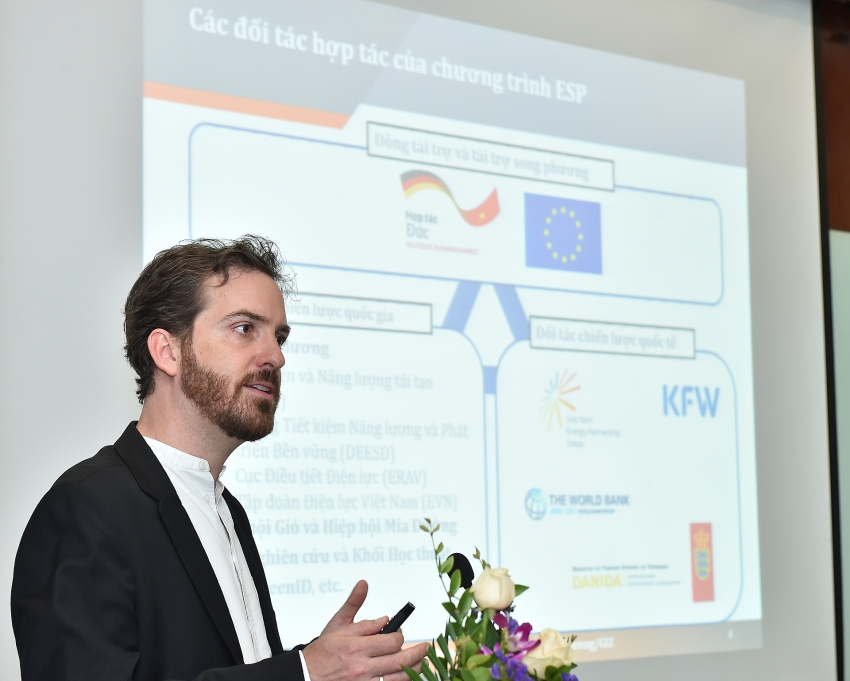Vietnam and Germany launch technical co-operation project on bioenergy
 |
| Tobias Cossen, project director at GIZ, speaking at the workshop |
Set to run from 2019 until 2023, BEM aims at improving the preconditions for the sustainable use of bioenergy for electricity and heat generation in Vietnam.
Besides an introduction to the BEM project itself, other topics presented at the workshop were the current context and outlook of bioenergy in Vietnam, opportunities and challenges for developing a bioenergy power plant in the country, and the nation’s need for bioenergy research.
At the workshop, Do Duc Quan, EREA’s deputy director general said, “As an agricultural country with a strong potential for bioenergy, the Vietnamese Government is striving to raise the share of biomass in its power production. Key policies and support mechanisms were promulgated in 2014 and have been amended and supplemented in 2020 to encourage private investment in the sector. With the measures, Vietnam expects to meet its goal for a biomass energy share of 2.1 per cent in the power production in 2030 stated in the revised Power Development Plan VII.”
Joerg Rueger, the German Embassy’s First Secretary, affirmed, “The BEM project will play a crucial role in supporting the Vietnamese Government in increasing the share of bioenergy within the country’s overall power mix. While wind and especially solar power have already shown their growth potential in Vietnam, the potential of bioenergy remains untapped. Given its specific relevance in the context of climate protection using already existing biomass from for example the agricultural sector such as bagasse from sugar production, it represents an important pillar in a sustainable power transition. A growing number of bioenergy power plants will support Vietnam to achieve its Nationally Determined Contribution (NDC).”
In particular, the BEM project will support the implementation and achievement of the renewable energy targets set out in the revised Power Development Plan VII, the Green Growth Strategy and the Politburo’s Resolution No. 55/NQ-TW on the Orientation of Vietnam’s National Energy Development Strategy to 2030, with the vision to 2045.
This goal will be facilitated through the project’s activities; namely, i) the improvement of the regulatory framework for biomass energy development, ii) the enhancement of the capacity of financial institutions, organisations, private sector companies, and individuals involved in the development, and iii) the fostering of technological co-operation, and research and development between international and Vietnamese stakeholders of the bioenergy sector.
The BEM project is funded by the German Federal Ministry for the Environment, Nature Conservation and Nuclear Safety (BMU) through the International Climate Initiative (IKI), under the implementation of EREA and GIZ.
The project will directly support policymakers and state officials at the central and provincial levels, as well as the private sector (including biomass energy investors and local consulting companies), financial institutions, research and development institutions, and universities who are working on the utilisation of biomass for heat and power production in Vietnam.
Its indirect and long-term beneficiaries are the electricity and industrial heat consumers, who will enjoy the future sustainable, clean, and cost-effective renewable energy as well as local farmers and workers who can gain economic co-benefits from the stable development of bioenergy (such as additional jobs).
After Hanoi, the next stop of the workshop is Ho Chi Minh City on June 11.
What the stars mean:
★ Poor ★ ★ Promising ★★★ Good ★★★★ Very good ★★★★★ Exceptional
Related Contents
Latest News
More News
- VNPAY and NAPAS deepen cooperation on digital payments (February 11, 2026 | 18:21)
- Vietnam financial markets on the rise amid tailwinds (February 11, 2026 | 11:41)
- New tax incentives to benefit startups and SMEs (February 09, 2026 | 17:27)
- VIFC launches aviation finance hub to tap regional market growth (February 06, 2026 | 13:27)
- Vietnam records solid FDI performance in January (February 05, 2026 | 17:11)
- Manufacturing growth remains solid in early 2026 (February 02, 2026 | 15:28)
- EU and Vietnam elevate relations to a comprehensive strategic partnership (January 29, 2026 | 15:22)
- Vietnam to lead trade growth in ASEAN (January 29, 2026 | 15:08)
- Japanese business outlook in Vietnam turns more optimistic (January 28, 2026 | 09:54)
- Foreign leaders extend congratulations to Party General Secretary To Lam (January 25, 2026 | 10:01)

 Tag:
Tag:























 Mobile Version
Mobile Version